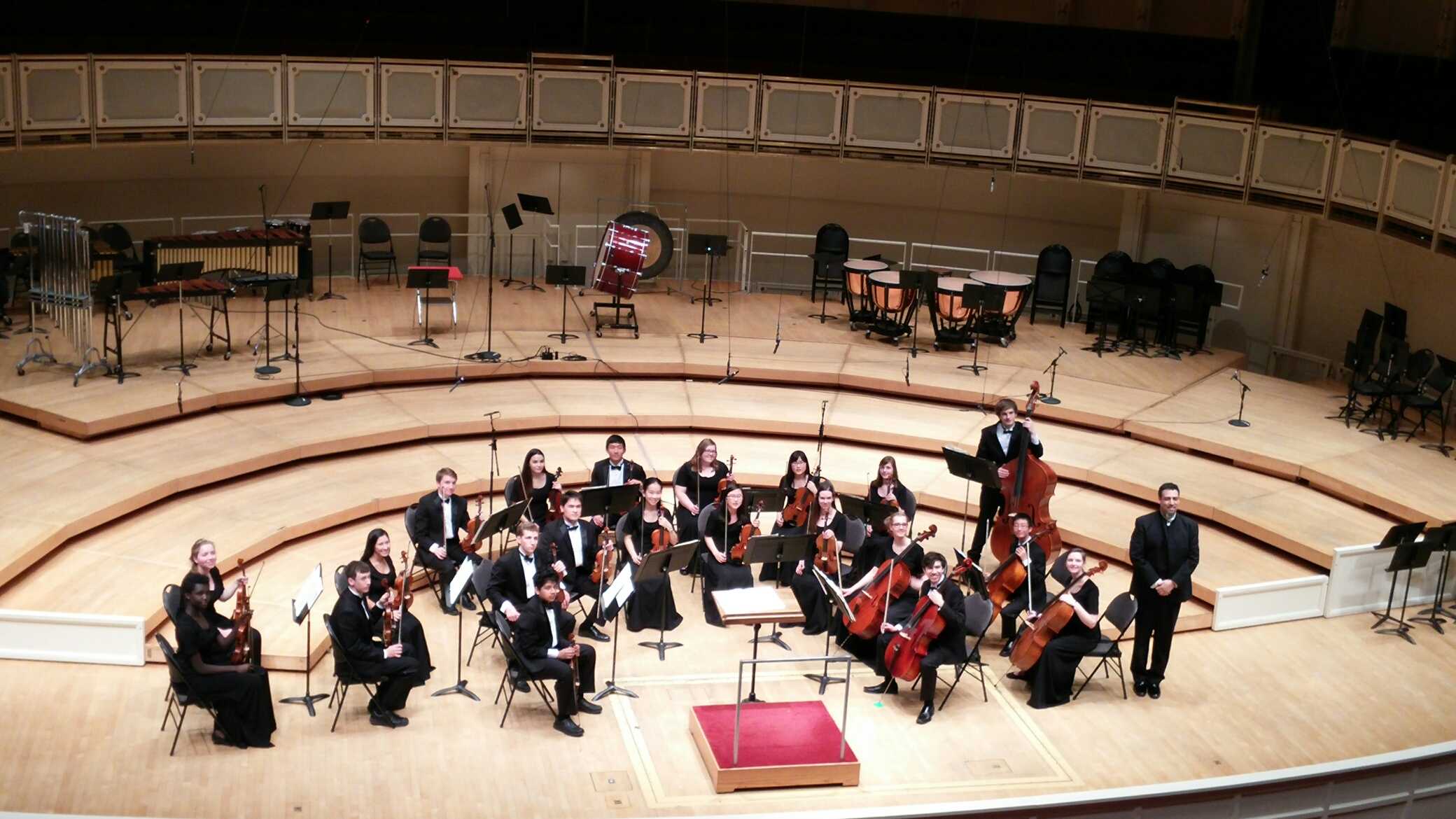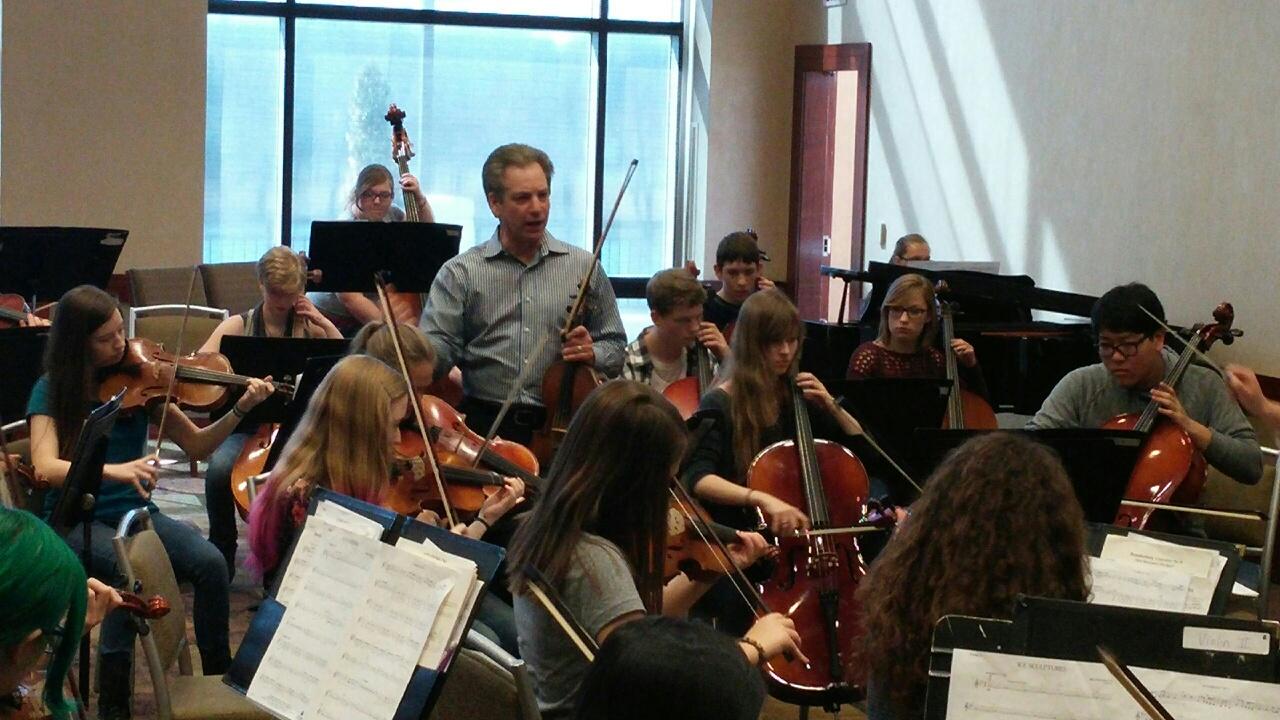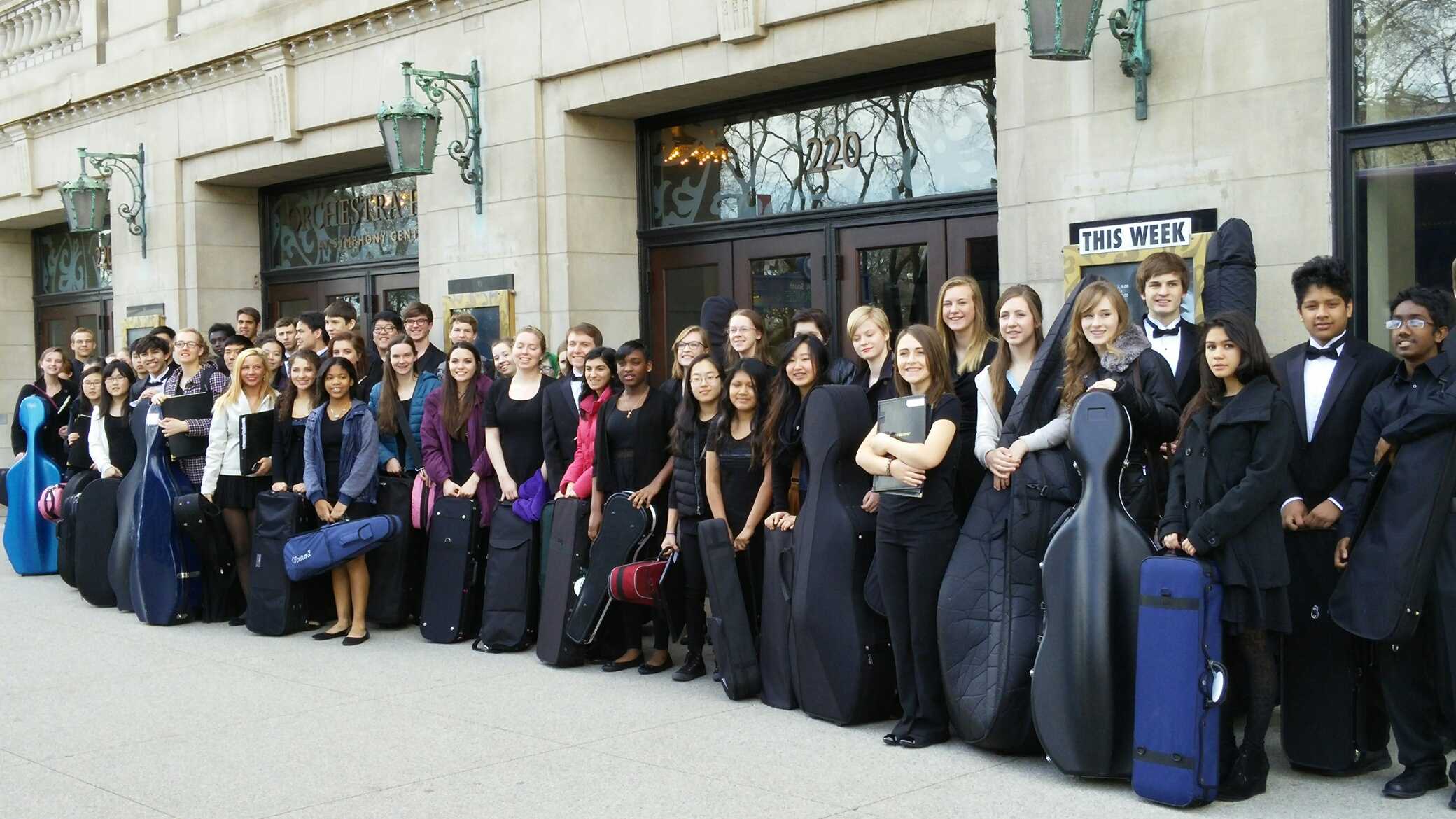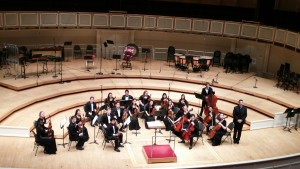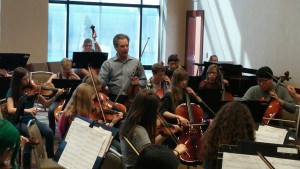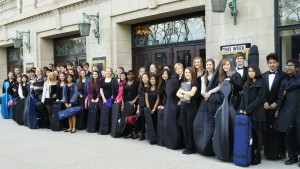Orchestra performs in Chicago
April 2, 2015
Everything from Giordiano’s pizza to the Chicago skyline was dwarfed in comparison to the musical experience the MHS orchestra gained at the WorldStrides Heritage Music Festival. After their exquisite success at the regional festival in Dallas, both the Chamber and Symphonic Orchestra trekked to Chicago to perform with the best high school orchestras in the US, Canada and Puerto Rico. In the end, the MHS Chamber orchestra continued their success, taking part in the encore performance.
“WorldStrides Heritage Music Festival has a festival system in which they do regional competitions and then the winners of those regional competitions are invited to participate in the national competitions,” Director Nate McClendon said. “If you go to a regional competition and you earn a gold rating — that means you earn a certain score — then you have a two year window in which to go to a Festival of Gold. So everyone that was there for Chicago had earned a Gold Rating within the past two years.”
The festival, unlike most, was focused on the musical experience as opposed to the competition aspect.
“The Festival Gold is a little different kind of festival; it’s very much a high-level musical experience,” McClendon said. “It’s a mandatory five days; it features only the best choirs, bands, and orchestras. You reform in a world-class venue. The one in Chicago was Chicago Symphony Hall and it’s one of the greatest, in the world, to play in. When you get to the Festival of Gold, it’s more than just a competition; in fact it’s not even really a competition. You’re not really competing against the other groups; they don’t rank you first, second, third. You did get scored; you get a rating. And rather than competing, what they do is at the end of the night they choose the best band, orchestra, and choir for the encore performance. So, if you’re thinking of it competitively, the highest scoring group in each discipline gets to perform.”
Earlier in the year, students auditioned to participate in the honors groups at the festival. Every student in MHS’s chamber orchestra was a part of the group.
“It was nice to play with other skilled musicians from the other orchestras at the festival,” junior and violist Emma Brase said.
In preparation for their performances, both orchestras took part hour-long clinics with the well-known Robert Gillespie.
“Unlike a typical festival, we had a one hour clinic with the string guru, Dr. Gillespie,” McClendon said. “We got to do a one hour rehearsal with just him and we did this before the competition when usually at festivals you play and someone comes and works with you afterward her we had our clinic. So he got to hear us, and work with us and show us things to help us perform even better which was really cool.”
The students appreciated Gillespie’s comments.
“He was a very energetic person, who was very funny,” symphonic orchestra cellist and sophomore Robin Joung said. “Everything that he had taught us during the clinic, I believe, helped us during our performance and will also help us in future performances.”
Brase thought similarly.
“Dr. Gillespie worked with both symphonic and chamber orchestras in clinics and it was really helpful to have him work with us and to have a different perspective from a great music professor,” Brase said.
Apart from playing their own instruments, the students were given the opportunity to listen to Chicago Symphony Orchestra in the historical Chicago Symphony Hall – the venue that they would play in the next day
“We went to see the Chicago Symphony Orchestra and they had a program before the actual concert called ‘Beyond the Score’ and the main concert was Brahms Symphony No. 3 so the beyond the score was kind of a background into the life of Brahms and the context of the composition which was cool,” Brase said.
The last day of their trip, the students performed for the judges and peers. For the symphonic orchestra, in particular, it was an important experience.
“The thing that was really good for us was we took not only the chamber, but the symphonic group also,” McClendon said. “They were the only group there that was not their school’s primary ensemble. I was really proud of them because they held their own against those top orchestras so that was cool. Of all of the students that went I would say the symphonic orchestra probably grew the most and the clinic they had with Dr. Gillespie really changed how they thought about themselves which was really cool. They all walked away from that rehearsal saying ‘wow we’re really good’ and they were all really excited about playing and that’s carrying through. That kind of confidence and ego boost—that’s the kind of thing you can’t put a price tag on. That kind of revelation and self discovery is really important.”
Joung agreed that symphonic held their own as a group.
“Everything was also a lot louder and the sound quality was far better than anything I’ve heard before, in terms of a building’s acoustics,” Joung said. “A small mistake could be easily heard and definitely noticeable. I definitely never imagined to become friends with people that I rarely I talk to. I definitely never imagined to become friends with people that I rarely I talk to. In my solo, I felt kind of crummy because I did mess up a lot, but as Symphonic Orchestra as a whole, I think we did great.”
After their performances, they awaited their scores and the possibility of the encore performance. McClendon was the first to hear the news.
“We had just had honor orchestra rehearsal, so the whole chamber orchestra was there,” McClendon said in recollection. “So while they were rehearsing the festival director called me back to talk to me and he said, you know, ‘you’re group was fantastic and we have to have you guys play and I want to let you know you’ve been selected to do encore.’ So I was super excited and happy, but I couldn’t let anyone else know that yet. So I take the kids, they pack up their stuff and we go outside so we;re on Michigan Avenue, and we’re just huddled there on the sidewalk. I had made a bet with the orchestra that if they got into encore performance that I would dye my beard. So I had them all huddled in and I asked them, ‘so what color do I have to dye my beard?’ And a few of them were like, ‘oh we know what that means,’ but the rest of them were dumb and didn’t get it so I had to say ‘yes, we got encore’ and there was just this huge eruption of pure energy. And so everyone that was walking the streets of Chicago stops and looks because you’ve got all of these kids in tuxes just out in the street and they’re all just screaming. So it was really cool and they were super excited. You could see the relief and the elation, because everyone that was there was good. When we went to Dallas we were like ‘oh, man we’re way better than these guys,” but here all of the orchestras were good; everyone was good. And we heard a lot of great groups, so there was definitely elation because that had been our goal all year.”
After being named one of the best groups in the nation, the students had to determine what they would play.
“The difficult part was that for the performance we only had ten minutes and our program was 20, so their job was to pick which movement we would play, because each movement was about ten minutes long,” McClendon said. “So there was a lot of debate because some people wanted to do the first and some wanted to do the fourth (the finale).”
They chose the finale. The performance that followed was emotionally charged.
“It was incredible on a lot of levels,” McClendon said. “Since it was the encore performance and we knew we weren’t being judged, I got them a little more emotionally prepared; I got them to a place where they would play more passionately. When we played for the encore performance, we might have been a little more sloppy compared to the first performance, but we were a whole lot more aggressive and a whole lot more passionate. It really was profound. I just remember standing there and you just soak in that moment. I was just standing there thinking to myself, ‘I’m thinking here conducting Tchaikovsky’s Serenade for strings in Chicago Symphony Hall, like this is really cool.’ How Many people get to do something like that? It causes you to step back and for me it caused me to kind of look back at my life and it took so much work. The work the students had to do to get to that level — all the private lessons and the practice – it’s humbling. You feel really small and you feel really big at the same time; it’s a strange feeling. But an amazing experience to have. I remember thinking back, like some of the world’s greatest conductors and composers have stood at that very place and it’s just me standing there. I’m sweating and it’s just really passionate and we’re working hard and my drops of sweat are mixing with amazing people’s drops of sweat. Ad look out at the kids and know they were right there with me, it’s a very personal kind of moment. It was surreal.”


